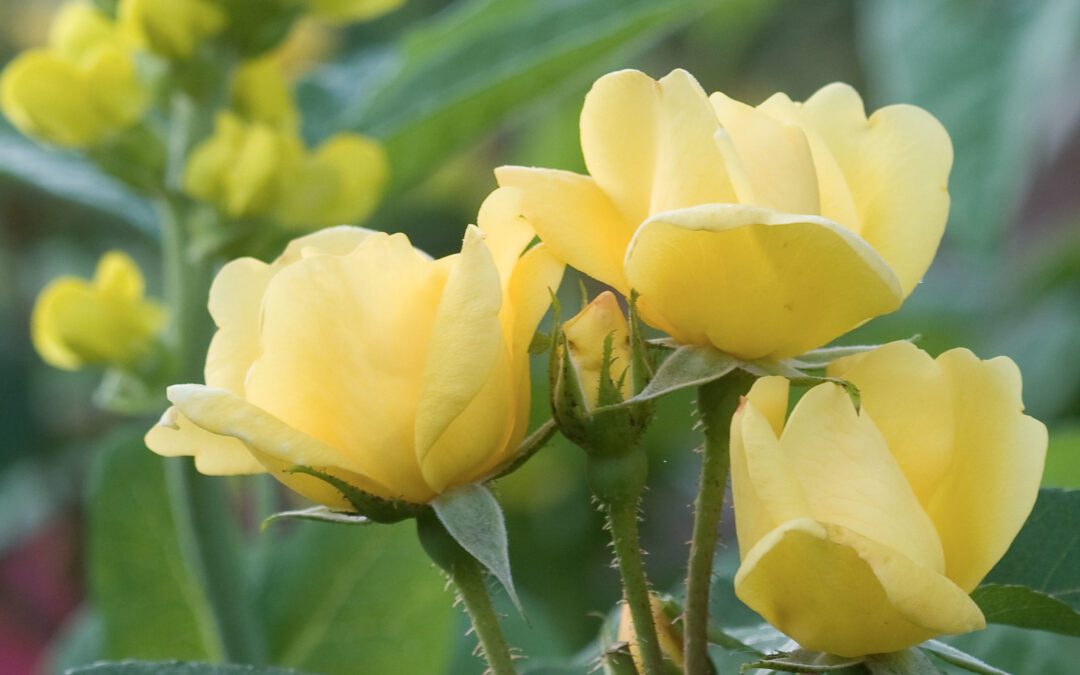It’s June and by the end of the month, many a gardeners’ most hated day of the entire summer will be here – the annual emergence of the dreaded Japanese Beetles.
Before their accidental importation to the United States, probably as grubs in the soil of imported iris, the beetles were found only on the islands of Japan, isolated by water and kept in check by natural predators. Even though a law was passed in 1912 to prevent the importation of plants rooted in soil, it was difficult to enforce. Japanese beetles was first reported at a nursery in New Jersey. Eradication programs were put in place, but the beetles were too prolific and widespread to stop and the programs were dropped by 1920. The rest is history.
Not much has changed for treatment of adult beetles. When your roses and trumpet-vines are crawling with beetles, munching and copulating, you want to DO something. Japanese Beetle Killer by Bonide is a great, ready-to-spray, contact insecticide that allows you to treat your small trees, as well as shrubs and roses. It is safe to use on edibles and ornamentals, and can be applied every 3 days if the insect pressure is high. Bear in mind that it is non-specific and will kill any insect that is sprayed, so try not to apply if there are bees or other beneficial insects around.
Consider too, erecting a barrier over your edible plants, like strawberries, summer-bearing raspberries and green beans with those handy floating row covers that you got for frost protection just a few short weeks ago. Beetles fly and land on plants, tending not to crawl up and onto them. Covering during the harvest period will protect the fruit and keeps the insecticide off your produce.
Another option is Captain Jack’s Dead Bug. It primarily targets munching insects like beetles and caterpillars. The active ingredient is spinosad which requires that the pest in question ingests the insecticide. As spinosad affects the digestive system, there will be some feeding, but beetles will die within a couple of days. Not as fast as the contact insecticides, but it is just as effective and considered an organic pesticide. And it will only kill the insects that eat leaves, flowers and fruit, making it safer for beneficials like bees and butterflies.
The old-fashioned methods, like handpicking, can be really good options if the populations are low. Fill a small bucket with water and swish in a few drops of liquid dish soap. This will break the surface tension of the water, so that when you pop those voracious monsters in the pail, they will sink, not float. A sharp fling onto a hard surface, followed by a quick stomp is also an effective, as well as satisfying method, though your neighbors may wonder if you’re practicing a new dance step.
And what about controlling the grub stage? Since a Japanese Beetle spends about 85% of its life underground as a grub, exercising control over them while they’re in your lawn is a very effective method to prevent damage to the grass. As the adults feed and return to the soil to lay eggs, grubicides do an excellent job of killing the young larvae. Early July thru mid-September is the best time to apply Bayer Advanced’s Season Long Grub Control. This product contains an ingredient that kills white grubs, including Japanese Beetles and June Bugs, along with several others. It needs to be applied every season.
If you’re looking for organic grub control, Milky Spore Powder by St Gabriel Organics is a one-time application that is guaranteed by the manufacturer to control grubs for ten years. It isn’t harmful to humans, pets or the environment and only kills the Japanese Beetles in the grub stage, making it safe for beneficial insects. The Garden Center carries Milky Spore Powder in several sizes, as well as the necessary applicator. St Gabriel also makes a granular version for spreaders that will require several applications over a two-year period to achieve the best results.
But be sure to remember that if your hope is to see fewer adults by treating the grubs, you may be disappointed. The grubs you kill in your lawn have little bearing on how numerous the adults will be. An important reason for this is that Japanese beetle adults are good fliers and can easily enter a property from adjacent areas. The best reason for treating grubs is to protect lawns from damage.
Finally, let’s talk about traps. Safer’s Japanese Beetle Traps use a pheromone lure to attract adult beetles and trap them in disposable bags. The drawback is that traps can be too effective. Even after accounting for the ones the traps catch and kill, you still wind up with an excessive number of beetles that wouldn’t have been there if not for the traps luring them in. So use them as a part of an overall strategy, placing them well away from roses, green beans, hibiscus and other favorites.


